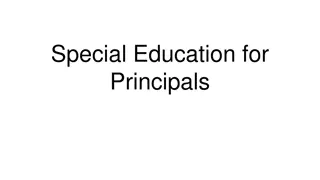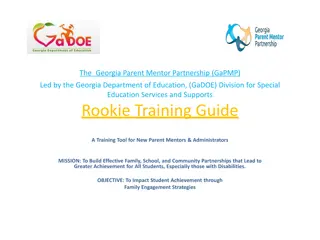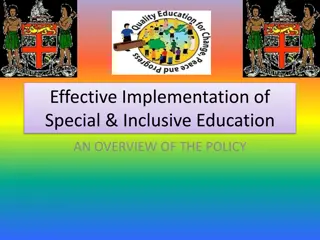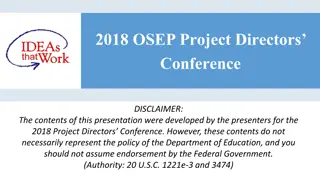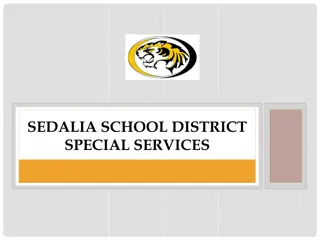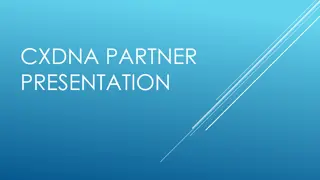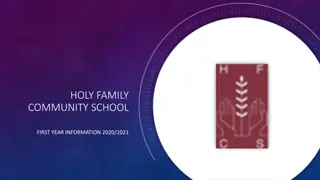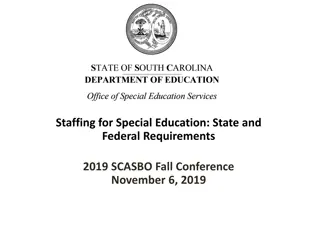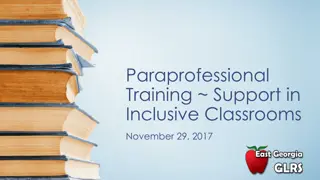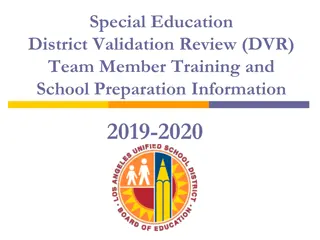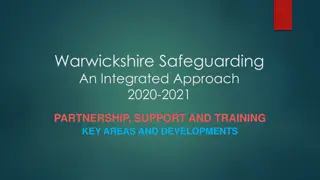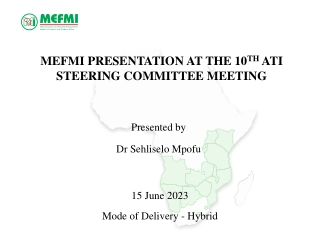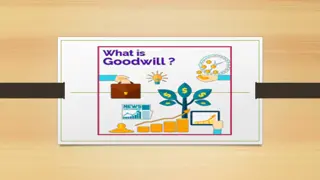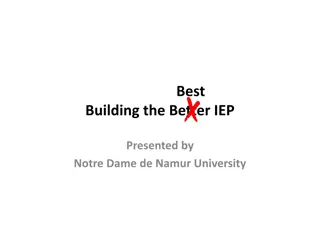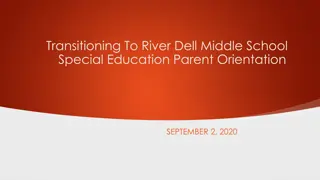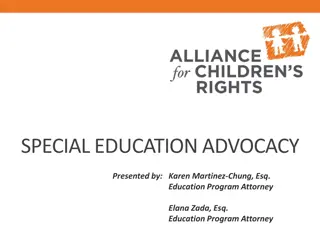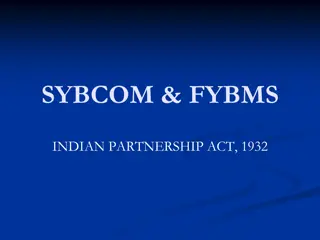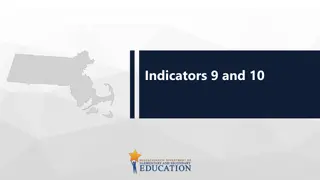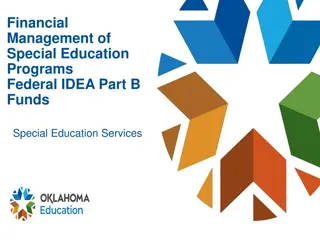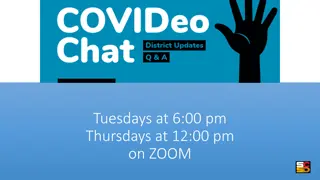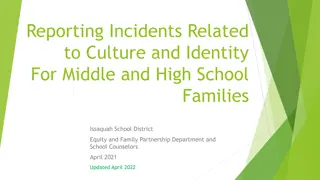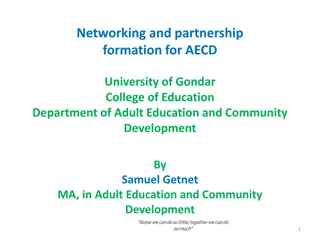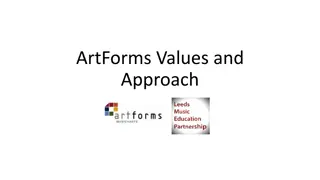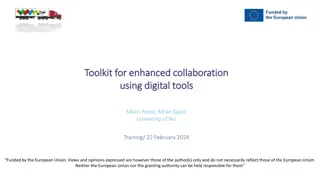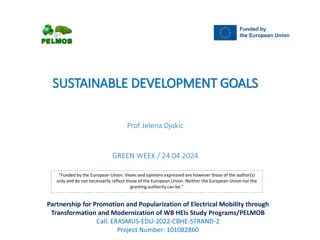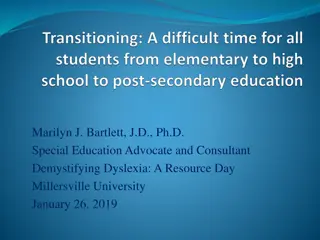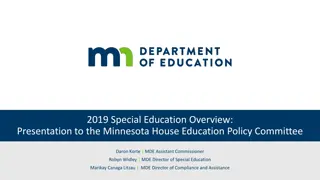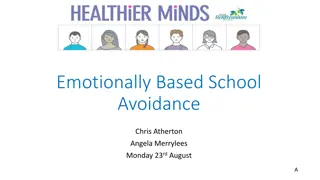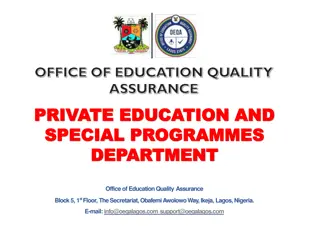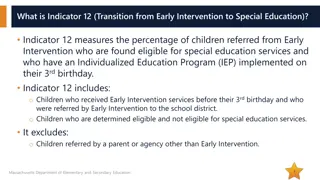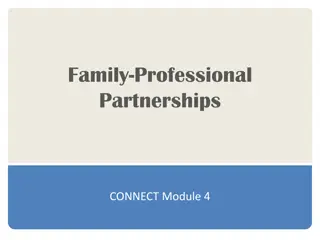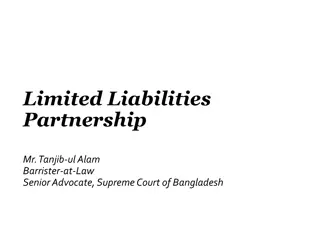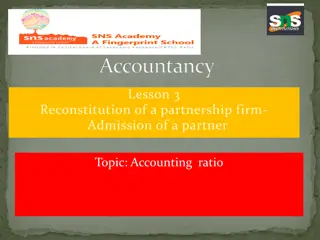Effective Collaboration in Special Education: Family-School Partnership
Special education emphasizes a partnership between family and school to provide services that address the student's needs in an inclusive environment. Collaboration thrives on mutual respect and positive communication. Acronyms such as IEP, SLP, and OT inform the specialized services provided, while a prior written notice outlines proposals and decisions concerning the student's program. With the impact of COVID-19, services may be adapted, and learning plans should ensure continuity of special education services with input from parents.
Download Presentation

Please find below an Image/Link to download the presentation.
The content on the website is provided AS IS for your information and personal use only. It may not be sold, licensed, or shared on other websites without obtaining consent from the author. Download presentation by click this link. If you encounter any issues during the download, it is possible that the publisher has removed the file from their server.
E N D
Presentation Transcript
SPECIAL EDUCATION Special education is a partnership of family and school. The goal of this collaboration is providing services to address the needs of the student in the Least Restrictive Environment This collaboration is most effective in the context of an environment of mutual respect and positive communication
DICTIONARY OF ACRONYMS IEP = Individualized Educational Program SLP = Speech and Language Pathologist OTR= Registered Occupational Therapist PT = Physical Therapist TA = Teaching Assistant RBT= Registered Behavior Technician BCBA= Board Certified Behavior Analyst FBA = Functional Behavior Assessment
PRIOR WRITTEN NOTICE The school district must provide you with a written notice when it proposes, or refuses, to take steps to identify your student, to evaluate your student, to provide special services to your student, or to change your student s program. Federal regulations call this a prior written notice. The written notice ( N-1) must: Describe what the school district proposes or refuses to do; Explain why the school district is proposing or refusing to take the action; Describe how the school district decided to propose or refuse to take the action, including telling you about each evaluation procedure, assessment, record, or report that your school district used to make its decision; and Describe any other options that your student's individualized education program (IEP) Team considered and the reasons why those options were rejected.
SERVICES IN TIME OF COVID DESCRIBED IN N-1 OR COVID SPECIAL ED LEARNING PLAN OSEP : As conditions continue to change throughout the country, some of the special education and related services included in a child s IEP may need to be provided in a different manner; however, all children with disabilities must continue to receive FAPE and must have the chance to meet challenging objectives. MA DESE : Dr. Russell Johnston, State Special Education Director and Senior Associate DESE Commissioner: Services may appear different. IEP teams should consider alternate available instructional methodologies or delivery such as online instruction, teleconference, direct instruction via phone or videoconferencing, or consultative services to the parent.
WHAT IS IN A COVID SPECIAL EDUCATION LEARNING PLAN ? Plan Should Include Describe how and when the school or district obtained parental input regarding the proposed differences in provision of special education services in a hybrid model. Describe how the accommodations, modifications, and services outlined in the student s IEP will be provided differently for modified in-person instruction than as written in the current, signed IEP.
COVID LEARNING PLAN CONTINUED Describe how the accommodations, modifications, and services outlined in the student s IEP will be provided differently in the remote environment than as written in the current, signed IEP. Describe what the parent should expect in the way of regular, ongoing communication from their child s special education team members.
WHAT IS PARENTAL CONSENT ? District cannot administer specific tests only to your child (vs. tests the whole class might take) without your consent The proposed test must be explained to you You can revoke consent at any time You cannot revoke consent for any action that has already taken place, but you can do so for future actions Your consent is not required for tests such as MCAS that are administered to all students
WHEN IS CONSENT REQUESTED? 1. To authorize an evaluation. 2. To provide services 3. To make changes in services 4. To access Mass Health or Medicaid benefits to pay for services for eligible students. 5. To excuse team members from a meeting. 6. When a student turns age 18, all of the decision-making rights that you have as a parent transfer to your adult student, unless a court has appointed a legal guardian for your student or your student indicates in writing that s/he wants to share decision-making with you or wants you to continue to have authority to make decisions about his or her educational program.
HOW TO WITHDRAW CONSENT If you have given consent to special education and related services and now wish to revoke your consent, you must do so in writing. Once you withdraw your consent to all special education and related services, the school district is no longer required to make FAPE available or to have an IEP meeting or develop an IEP for your student . School districts are not required to amend your student s record to remove references to special education services as a result of your revocation of consent.
PARENTAL REQUEST TO EVALUATE 1. Upon receipt of a request for an initial evaluation, the school district must send notice to the parent and must seek the parent s consent to conduct an evaluation. 2. A school district will rarely have occasion to refuse to conduct an initial evaluation and may do so only if the parent or other individual making the referral has no suspicion of disability or is not concerned about the student s development 3. The school district may provide the parent with information concerning other supportive services that may better suit a particular student s needs. 4. The school district may not refuse to evaluate a student who has been referred for an evaluation on the basis of a pre-referral program or in order to try other instructional support activities or for any other reason
INDEPENDENT EDUCATIONAL EVALUATION (IEE) You have the right to request an IEE of your student at public expense if you disagree with the school district s evaluation. You should think of an IEE as a second opinion, You cannot have one at District expense if you have not consented to the District s own evaluation. If you request an IEE, the school district must provide you with information about where you may obtain an IEE and about the state requirements that apply to IEEs. The IEE is subject to rate setting commission rates, and the evaluator must be licensed in MA.
IEE (CONTINUED) You are entitled to only one IEE of your student at public expense each time your school district conducts an evaluation. You may have independent evaluations conducted at your own expense at any time. If you obtain an IEE of your student at public expense or if you share with the school district an evaluation of your student that you obtained at private expense, your school district must convene a Team meeting within ten school working days after receiving the evaluation information. The Team will consider the evaluation results and determine if any, changes should be made to your student s IEP.
STUDENT RECORDS The student record consists of your student s transcript and temporary school record and includes health records, tests, evaluations, discipline records and other records pertaining to your student s special education eligibility or program. You and your student (if your student is 14 or older) have a right to look at any and all of the student s records within 10 days of your request and before any IEP meeting or due process hearing. You may also have copies of the information upon request for a reasonable charge limited to the cost of reproduction.
STUDENT RECORDS (CTD.) In addition, you can meet with professionally qualified school personnel to have the records explained. If a student s parents revoke their consent for special education services after such services have been initially provided, school districts are not required to amend the student s records to remove references to special education services. The school district can only limit access to the student record if it has received a legal document such as a restraining order or a divorce or custody decree that restricts access to information about the student.
HOW ARE DISAGREEMENTS RESOLVED? Parents may bring a disagreement to attention of District and a meeting is held.The school district is required to set up a resolution meeting within 15 calendar days of receiving your due process complaint. Problem Resolution System(PRS) can be contacted in writing with a complaint. The parent and district can engage in mediation with a mediator from the Bureau of Special Education Appeals. (BSEA) .
RESOLVING DISAGREEMENT (CTD.) The parent and District can agree to hold a facilitated meeting with a facilitator from BSEA. The parent can file a Hearing request with the Bureau of Special Education Appeals. A hearing officer s decision on whether your student is being offered a FAPE must be based on a finding that your student s special education rights were violated or a determination that the school district failed to fulfill its other obligations to your student under the special education laws and regulations
PLACEMENT IN PRIVATE SETTING A parent may enroll his or her student in private school at private expense at any time. If, however, the parent believes that the public school should be responsible for the costs of the student s education in the private school, the parent must tell the school district of objections to the student s IEP and program, reject the IEP, inform the school district of his or her intent to remove the student and enroll the student in a private school, and request a hearing by the BSEA. A parent must inform the school district before removing the student from the public school either orally at the last Team meeting before the removal or in writing at least 10 business days before removing the student from school. The school district is not required to pay for a student to attend a private school if the school district has made a FAPE available to the student Disagreements between parents and the school district about whether the student s program provides a FAPE and requests for financial reimbursement for the cost of a private program may be resolved through a BSEA Hearing
TRANSITION PLANNING Planning for transition must be based on your student s strengths, preferences, interests, and needs, must begin when your student is 14, and must be discussed each year at a Team meeting. The school district must discuss your student s transition needs with you and your student and must consider the goals for your student after he or she completes school by graduating with a regular high school diploma or reaching the age of 22. School districts must use the Transition Planning Form (TPF) to record the results of this annual discussion. The student s IEP must include measurable post-secondary transition goals, objectives and services based upon an appropriate assessment of his or her disability and transition needs.
DISCIPLINE FOR STUDENTS WITH DISABILITIES 1. Schools are expected, and high schools are required, to publish their rules of conduct so that students know how they are expected to behave. 2. Any student may be suspended or removed from school for disciplinary reasons for a short time, which is no more than 10 days. Before any removal or suspension the student must be informed about what he or she is accused of having done and must be given a chance to tell his or her side of the story. 3. During a short disciplinary removal, the school is not required to provide instruction to a disabled student unless it is does so for non-disabled students. Once a student with a disability has been removed from the school placement for more than 10 cumulative days during the school year the student must receive educational services that will allow the student to continue to participate in the general education curriculum and to progress toward the goals set out in his or her IEP
DISCIPLINE (CONTINUED) If a student is removed for disciplinary reasons for more than a total of 10 days in any school year , the district must hold a Manifestation Determination meeting to determine if the misbehavior was caused by or had a direct relationship to the student s disability, or was the direct result of the school s failure to provide the services required by the student s IEP. If the team determines that the student s behavior was not caused by or directly related to the student s disability or the failure to properly implement the IEP, then a student with a disability can be disciplined in the same manner and for the same length of time as other students are disciplined for the same offense. If the Team determines that the student s behavior was caused by or directly related to the student s disability or the failure to properly implement the IEP, then the student must be returned to the last approved IEP placement The Team must also conduct a Functional Behavior Assessment . A functional behavioral assessment or FBA is a comprehensive assessment of behavior that provides the IEP Team with information about the student s behavior and identifies behavioral intervention services and program modifications that are designed to address the behavioral violation so it does not recur.
IMPLICIT RIGHTS Implicit Parental Rights include Being treated in a respectful manner, and treating others respectfully. Communication that includes acknowledgement of a request, especially when the response may require research Receiving documents that are clear and jargon-free, and in your primary language. Experiencing professionalism in all aspects of the meeting and evaluation process, even if there is an agreement to disagree A process that has the needs of the student at its very core
TRANSPORTATION If the student does not require transportation as a result of his or her disability, then transportation shall be provided in the same manner as it would be provided for a student without disabilities. In such case, the IEP shall note that the student receives regular transportation if the school district provides transportation to similarly situated students without disabilities. If the student is placed in a program located at a school other than the school the student would have attended if not eligible for special education, the student is entitled to receive transportation services to such program.
ONE HOUR LIMIT If the student is attending school away from the District, the parent must sign off acknowledgement if the duration of the commute can ever exceed one hour Transportation is considered a related service that is provided in order for the student to access education Family always has the right to provide transportation and be reimbursed, or to work with the rest of the Team to determine a closer placement which meets the student s needs.
IMPORTANT CONCEPTS IN SPECIAL EDUCATION Least Restrictive Environment Data-driven and evidence based Maximizing use of strengths Goals appropriately ambitious in relation to student need, offering opportunities to meet challenging objectives Transfer of skills to real-life Ultimate goals: increased independence and self-advocacy both now and post- 22
CONTACTS Meg Finnegan, Ipswich High School Program Manager, mfinnegan@ipsk12.net Jackie Potter, Ipswich Middle School Program Manager, jpotter@ipsk12.net Elyssa Brand, Doyon School Program Manager, ebrand@ipsk12.net Margaret Madeiros, Winthrop School Program Manager, mmadeiros@ipsk12.net Dr. Beverly Hegedus, Pupil Personnel Services Director, bhegedus@ipsk12.net


